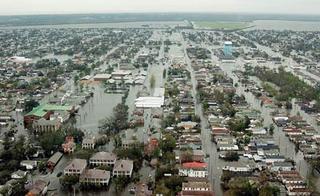 Whenever destruction happens on a large scale, such as is happening now in New Orleans and the American Gulf coast, the economically illiterate exercise their natural wish to find something good out of tragedy by talking nonsense. In the case of destruction on such a massive scale, the nonsense usually takes the form of arguing that such destruction is 'good for the economy.' "Look at how much work has been created," say the illiterate, ignoring how many lives have been lost and how much wealth has been destroyed.
Whenever destruction happens on a large scale, such as is happening now in New Orleans and the American Gulf coast, the economically illiterate exercise their natural wish to find something good out of tragedy by talking nonsense. In the case of destruction on such a massive scale, the nonsense usually takes the form of arguing that such destruction is 'good for the economy.' "Look at how much work has been created," say the illiterate, ignoring how many lives have been lost and how much wealth has been destroyed.The Mises blog has spotted the first occurrence of this fallacy in the popular press, from the New York Times/International Herald Tribune (dated Sept 1):
But economists point out that although Katrina has destroyed a lot of accumulated wealth, it ultimately will probably have a positive effect on growth data over the next few months as resources are channeled into rebuilding. "Longer term, in the wake of a number of hurricanes there is actually an increase in measured output that even shows up at the national level, because there is a whole bunch of rebuilding activity," said Stephen P.A. Brown, director of energy economics at the Federal Reserve Bank of Dallas.As the Mises blog comments in rebuttal:
But why wait for Mother Nature's random acts of destruction to help get the economy going? Why waste the expertise that the U.S. government has in the area of destruction? So, to help kickstart the economy we should evacuate all major urban areas and then unleash a massive dose of B-1 bombers, F-16 fighters and Cruise missiles and reduce all cities to rubble. Just think of the unprecedented construction boom this would help create!Stephen A. Brown and others of his ilk have clearly never read the classical debunking of this idiocy, Frederic Bastiat's short piece What Is Seen and What Is Not Seen, a wonderful piece of writing that I heartily commend to your attention. Destruction is never good. On a scale such as this there is no good news in it, whatever the economically illiterate might try and tell you.
No comments:
Post a Comment